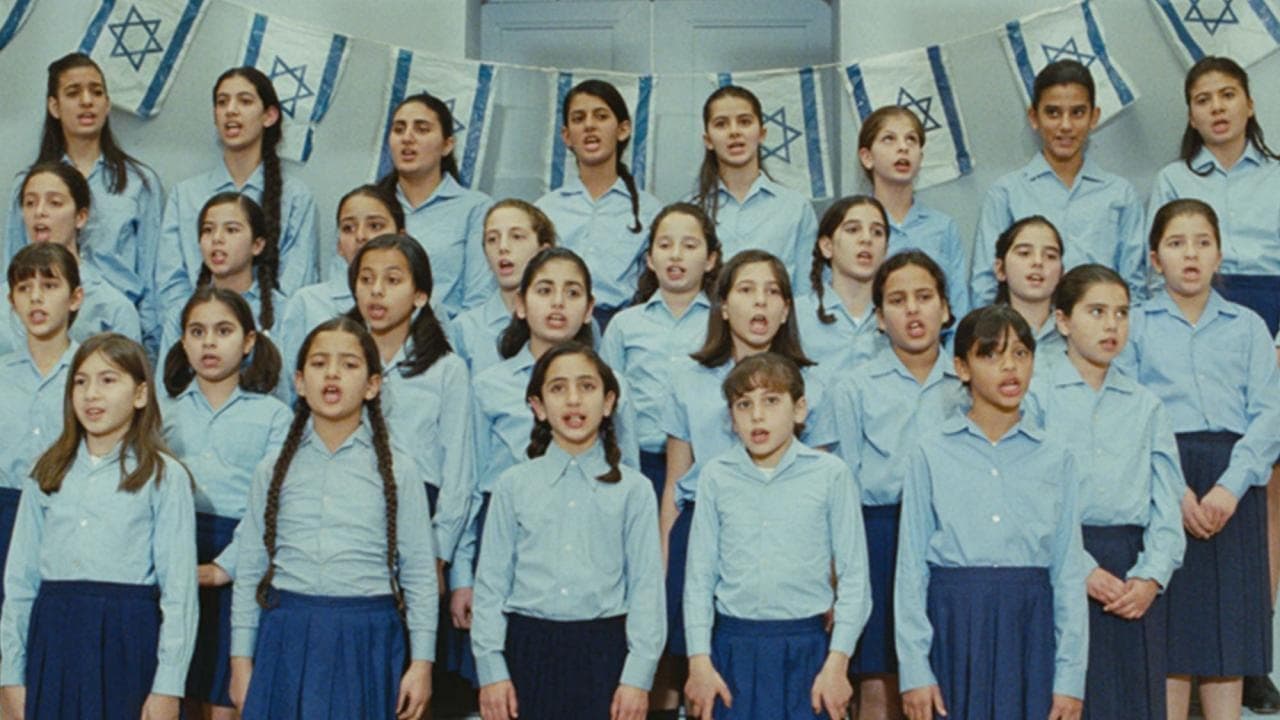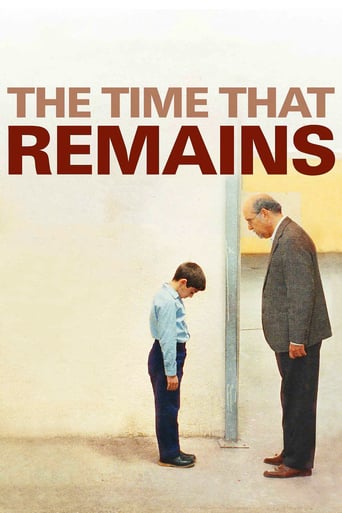Smartorhypo
Highly Overrated But Still Good
Peereddi
I was totally surprised at how great this film.You could feel your paranoia rise as the film went on and as you gradually learned the details of the real situation.
ChanFamous
I wanted to like it more than I actually did... But much of the humor totally escaped me and I walked out only mildly impressed.
Sharine Atif
This film has a very distinguished style and sense of humor for such a dark topic on the conflict of Israel and Palestine. It reflects three generations of the conflict through the perspective of Es (the protagonist) who plays a child, a teenager and an elder man. He never speaks perhaps as a metaphor representing the voiceless. One thing I was also able to appreciate as an Egyptian audience, the Egyptian songs by Laila Mourad and Mohamed Abdel Wahab, as well as some Egyptian news references, like on the death of Egypt's President Gamal Abdel Nasser in 1970. Something that a Western audience may not at all experience in the same way a Middle Eastern or Arabic Audience would, is almost like a cheery on the icing for people of that culture, a little gift made exclusively for us, that only we can feel nostalgic about and understand the reference to that culture and era. This film portrays the issue as a gray issue and does no only show the oppressive and inhuman acts of the Israeli Militants, like when they throw Es' father off a cliff. A few scenes show a very human side to them as well, like in the scene when they call out to stop a dance party because of curfew, the first idea that came to mind was the cultural deprivation, but when the military figures start dancing to the music track, it highlights that both sides unite by liking the same music. In another scene, when Israeli military move furniture items onto a truck, the listen to music and smoke cigarettes, somehow very subtly reveals them as ordinary military base figures on duty, it does not look so different from Egyptian bases. He also does not glorify all Palestinians as victims. We get to see a Palestinian who joins the Israeli military and is perceived as a traitor, and called out on it, but he explains later how he needs the work to feed his family. Another very interesting portrayal of how a land under an occupation becomes so natural and part of the backdrop and landscape of the environment, like in the scene when a guy on the cell phone who walks back and forth is pointed at with a tank tracking his every move. The guy does not react at all. This film had a very promising subtle message that the issue is gray and complicated and it seems to be a wish to focus on the good sides in both sides and bringing people together.
p-stepien
A quick history of Absurdistan, the country now known as Israel or Palestine (depending on which part of the wall you end up on). A personalised account starting from the Jewish take over of Palestine in 1948 and leading up to current day Israel. The movie however is less about the big picture, Palestinian-Israeli relations, but more about the very personal story of Elia Suleiman, his father - a resistance fighter - and mother.The backdrop of history is used with great consequence, as Suleiman drives his tale through varying levels of absurdity and yet manages to deliver an emotionally gripping tale. Scenes of profound sadness, like the death of Elia's father, are preceded by short, but realistic, sketches of the ludicrous and nonsensical, like a tank following a man taking out the trash. However Suleiman delivers it with such class, that he never once dances with being a pastiche and remains a poignant, artistic picture throughout. Instead of making a dramatised account full of grief and sadness, Suleiman does the unthinkable with a devastating effect: laughs it all out.Elia Suleiman is increasingly proving himself to be not only the most important Palestinian director, but also the best Israeli one as well. Talk about being absurd...
jotix100
This is an evocative film by Elia Suleiman that was shown at IFC recently. The story takes us back to the city of Nazareth where the director was born. It is a chronicle of the events in that part of the world and the changes that have occurred there. It is basically an account of the life of Mr. Suleiman's parents as they lived the events that go back a number of years in the middle of the Israeli-Palestinian conflict that befell that area.Life as an Arab in Israel is examined by Mr. Suleiman at key points as they happened. Fuad, the father in the film, must deal with what comes his way. Life in the city goes through changes as history comes to change things for the family. There is a running joke about food sent from an aunt that no one wants. The main events happened in 1948, as the state of Israel was being born. Later periods take a look at other aspects of the life of what one feels is the family of Mr. Suleiman.The atmosphere of Nazareth, wit its amazing light is captured by the cinematographer Marc-Andre Batigne. Saleh Bacri, who plays Fuad, shows why he is one of the prominent actors working today. He made quite an impression in "The Band's Visit". The director, Mr. Suleiman shows up toward the end in an enigmatic segment where he seems to be absorbing the history he and his family witnessed in Nazareth.
nyshrink
This film, like most Elia Suleiman films, uses real time, absurdity, symbolism and scenes from Suleiman's life, at the same time portraying history and current events. As typical of Suleiman it is also a very personal film, the most personal of the ones I've seen (Divine Intervention, Chronicle of a Disappearance). It is a reminiscence of his family from the time of 1948, when the state of Israel was created on the land called Palestine, to the present day.The film covers events including the war of 1948, the death of Nasser, the resistance against Israeli occupation, and the deterioration of Palestinian society in recent times. It is filled with Suleiman's typical tragicomic scenes of interaction between Israelis and Palestinians. It is a very sad film, however, the humor that runs through the film, and the suspense that is created by filming in real time, keep the film engaging even though like Suleiman's other films the pace is somewhat slow.

